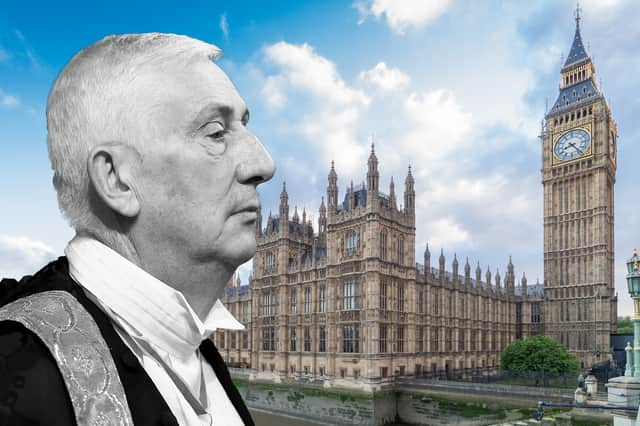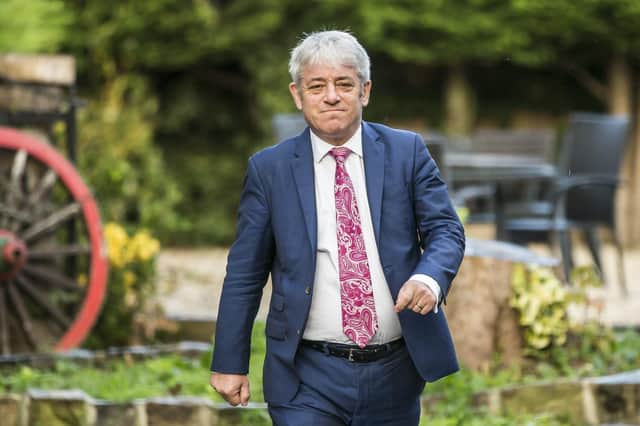What did Sir Lindsay Hoyle do? Speaker of House of Commons controversy explained, will ex-Labour MP resign
and live on Freeview channel 276
Sir Lindsay Hoyle is under increasing pressure to resign as Speaker of the House of Commons over the chaotic scenes during the Gaza vote.
At least 59 MPs have now signed a motion of no confidence in Hoyle and while this is not binding, if the Speaker loses the confidence of the Commons it is almost impossible for him to continue. Scottish National Party leader Stephen Flynn has called for a vote on the future of Hoyle, while Conservative MPs have spoken out to defend him.
Advertisement
Hide AdAdvertisement
Hide AdHoyle told the Commons: “I will reiterate I made a judgement call that didn’t end up in the position where I expected it to. I regret it. I apologise to the SNP… I apologise to the House. I made a mistake. We do make mistakes. I own up to mine.”
Hoyle is under pressure amid accusations he helped Keir Starmer avoid another damaging revolt over a ceasefire in Gaza by upending parliamentary convention in approving Labour’s bid to alter an SNP motion calling for an immediate ceasefire in the Israel-Hamas war. Questions have been mounting about what discussions were had before the vote amid Tory and SNP suggestions that the opposition sought to influence his controversial decision.
But who is Lindsay Hoyle, what happened in Parliament yesterday and will he have to resign? Here’s everything you need to know.


Who is Sir Lindsay Hoyle?
Sir Lindsay Hoyle is the current Speaker of the House of Commons and has been the MP for Chorley since 1997. Originally a Labour MP, he renounced his party when he took up the non-partisan role to chair the Commons.
Advertisement
Hide AdAdvertisement
Hide AdHe is the son of former Labour MP Doug Hoyle, and grew up in Adlington, Lancashire. He was elected as an MP for Chorley in 1997 as Tony Blair won in a landslide, but never became a Cabinet Minister.
He fought with Blair on Gibraltar and introducing tuition fees, saying: “I'm not anti-Tony; he made us electable and won three times. But there are principles and promises you don't break.” He voted against the Lisbon Treaty in 2008, which further solidified the European Union, and has never said which way he voted in the 2016 referendum.
In 2010, he became a Deputy Speaker to John Bercow, handling the Brexit bill and the Parliamentary lockdown that followed the Westminster terror attack in 2017. Then in 2019, he was elected to replace Bercow as Speaker.
My colleague Nicola Adam, of the Lancashire Evening Post, says Hoyle still takes his responsibilities to Chorley serious, writing: “He spent almost every Saturday for a year standing up outside Chorley Hospital in rain or shine with campaigners - pushing for the reopening of a 24 hour A&E after it's post-Covid closure.
Advertisement
Hide AdAdvertisement
Hide Ad“But that's Lindsay, who in his constituency of Chorley in Lancashire at least, is very much considered a man of the people and one of them. He may have been knighted in 2018 and be the Speaker of the House, but describes himself as 'Chorley through and through' and he is.”


What is the Speaker of the House of Commons’ role?
The Speaker of the House of Commons is an apolitical role. An MP is elected into it, however when that happens they have to renounce their party and they cannot vote. This is the first item of business for Parliament after an election, as the House of Commons cannot sit until a Speaker is elected, and this is carried out by secret ballot.
Dr Thomas Eason, from Aston University explained that the Speaker is the main umpire of the House of Commons. They are responsible for choosing some of the issues that get discussed in the chamber, for choosing who gets to speak and how long they get to speak for, and for maintaining parliamentary rules.
The Speaker has to maintain order in the Commons and chastise MPs when they inevitably make too much noise. During the Brexit bill, he told off SNP MPs for singing the European anthem during proceedings.
Advertisement
Hide AdAdvertisement
Hide AdIn recent times, Speakers such as Bercow and Hoyle have been forced to make important decisions on how Parliament’s rules should be interpreted, especially around Brexit. It is this which has led to some of the controversy around Hoyle following the Gaza ceasefire vote.
What did Sir Lindsay Hoyle do?
Hoyle has been accused of bias towards his old party Labour for selecting their amendment on an SNP Opposition Day Debate. All non-governmental parties get the chance to bring forward motions and debates in the House of Commons and on Wednesday it was the SNP’s turn.
The nationalists pushed for a vote on a ceasefire in Gaza, using wording Labour would never agree with, to pile pressure on Keir Starmer - who saw 56 MPs rebel against him when there was a similar vote. This led to Starmer also putting in his own amendment, also calling for an “immediate humanitarian ceasefire”.
Then the government put in its own amendment, urging an “immediate humanitarian pause” leading to a “sustainable ceasefire”, to try and bump off the Labour amendment and forced Starmer’s MPs to rebel. The reason why this would likely eliminate Labour’s motion is that there can normally only be a maximum of two amendments in an Opposition Day Debate.
Advertisement
Hide AdAdvertisement
Hide AdThere is the opposition’s motion, in this case the SNP, and then if that fails to pass, the second amendment will be voted on. As was the case last night, if more than two amendments are selected and the first vote is passed, then the second amendment (the SNP’s) would not get voted on - despite it being their Opposition Day Debate.
It is up to the Speaker to select the amendments, and in this case he broke with precedent and picked all three for votes - the Labour one first, then the SNP’s and after that the government’s. Hoyle said he took the decision to allow all sides to “express their views” and that he was “very, very concerned about the security of all members”.
The Clerk of the House of Commons wrote to Hoyle warning him that this was breaking long-established precedent. While Tory and SNP MPs accused Starmer of influencing Hoyle to choose the Labour amendment to avoid a rebellion, something the leader has denied.
In protest, the Conservatives and the nationalists pulled their amendments, so the Labour motion was passed by default. Members of both parties have since called for Hoyle to quit, saying his position is intolerable.
Advertisement
Hide AdAdvertisement
Hide AdWhat has Sir Lindsay Hoyle said?
In the House of Commons on Wednesday night, Hoyle said: “I thought I was doing the right thing and the best thing, and I regret it, and I apologise for how it’s ended up.” Today (22 February) he once again apologised to MPs.
Hoyle said: “I will reiterate I made a judgement call that didn’t end up in the position where I expected it to. I regret it. I apologise to the SNP… I apologise and I apologise to the House. I made a mistake. We do make mistakes. I own up to mine.”
He added: “I will defend every Member in this House. Every Member matters to me in this House.” His voice faltering, Hoyle said: “And it has been said, both sides, I never ever want to go through a situation where I pick up a phone to find a friend, of whatever side, has been murdered by terrorists.” Hoyle was Speaker when Sir David Amess MP was murdered by an Islamist.
Will he have to resign?
There is now serious pressure on Hoyle. At least 59 MPs have signed a non-binding motion of no confidence and SNP leader Stephen Flynn has called for a vote on this. Flynn said: “Mr Speaker it [the House of Commons] descended into farce because of a decision that you made, and you alone made, to ignore the advice that was given to you by the clerks.
Advertisement
Hide AdAdvertisement
Hide Ad“In doing so, on the opposition day of the Scottish National Party, my colleagues and I were denied the ability to vote on a matter which is of grave concern to us and which over recent months we have sought to raise in this chamber at every available opportunity.
“It ultimately turned into a Labour opposition day. That quite frankly is not acceptable. And as I have expressed to you privately prior to proceedings here today, we do not on these benches therefore believe that you can continue in your role as Speaker. We do not have confidence in your ability to do so.”
A number of MPs have spoken up in support of the Speaker. Tory Brexiteer Mark Francois told the House that Hoyle “not the villain here” and “we are lucky to have him”. He said: “Collectively last night was not our finest hour, but Mr Speaker has apologised to the House for his role in what happened, he showed evident contrition and I think we should respect that.”
He added: “Speaking purely personally, I well remember everything that the Speaker did to help me and all of us when our great friend [Sir David Amess], my best friend, was murdered as it happens by an Islamic extremist.”
Advertisement
Hide AdAdvertisement
Hide AdIf Hoyle was to be deposed, the vote would likely need government support, and so far Rishi Sunak has shown no indication he would like to remove the Speaker. His official spokesman said this morning: “The Prime Minister’s focus is on addressing the situation in the Middle East. And as I say, that is what he’s spending his time focused on. Matters for the House, as I say, are matters for the House.”
While Labour MP Alistair Strathern told NationalWorld he backed Hoyle. He said: “Parliamentary procedure can seem surreal to anyone looking in at the best of times, and it’s certainly been no different for me since being elected. Last night the challenges of process and behaviour of some members fell far short of that demanded by the gravity of the issue under discussion.
“Given the seriousness of the issue and range of views expressed by members, I agreed with the Speaker's approach to enable votes on a range of views.”
Ralph Blackburn is NationalWorld’s politics editor based in Westminster, where he gets special access to Parliament, MPs and government briefings. If you liked this article you can follow Ralph on X (Twitter) here and sign up to his free weekly newsletter Politics Uncovered, which brings you the latest analysis and gossip from Westminster every Sunday morning.
Comment Guidelines
National World encourages reader discussion on our stories. User feedback, insights and back-and-forth exchanges add a rich layer of context to reporting. Please review our Community Guidelines before commenting.
